Studying Saint Sava’s Zakonopravilo allows us to dive into the past and see how our faith looked eight centuries ago. For example, what did the Jesus Prayer look like at that time?
Before I delved into the text, I assumed that this most fundamental prayer had remained unchanged over time, but that’s not the case.
The Jesus Prayer, the shortest prayer, today reads:
Lord Jesus Christ, Son of God, have mercy on me, a sinner.
However, in Saint Sava’s Zakonopravilo (translated by Professor Miodrag Petrović), during the Nemanjić era, it read:
Lord Jesus Christ, Our God, have mercy on us.
Thus, there are two significant differences. First, it doesn’t say “Son of God” but “Our God,” and second, it doesn’t say “have mercy on me, a sinner” but “have mercy on us.” Now, to someone who doesn’t practice prayer, this may seem like an insignificant difference not worth mentioning, but for those in the faith, these are very important distinctions.
Our God
When you say “Son of God” to a monk, he, due to his theological education, understands that referencing the Son, the Father, and the Spirit is the same as referencing Jesus Christ, as He has three hypostases (persons). However, for beginners and the general public, this theological definition is quite abstract, and people logically ask, “If Christ is the Son, then who is the Father?”
They will arrive at answers in various ways, but since documentaries and internet content about the “Old Testament God” and “Jewish origins” are pervasive, many come to the wrong conclusion that God the Father is, in fact, the Old Testament Jewish Yahweh or something similar. Unfortunately, these documentaries are often deliberately made to confuse people, offering “scientific” explanations of historical events to promote the idea of Judeo-Christianity, which is a complete falsehood.
The Orthodoxy of Saint Sava is not Judeo-Christian and cannot be because the Zakonopravilo contains numerous provisions against Jews, integrated into our faith by the Holy Fathers at Ecumenical Councils. Nothing could be further from the truth than the Judeo-Christian colorful lie, and I have already written about this. This is clear to anyone who has read the Zakonopravilo.
I once heard a cleric say, “Our God is the Holy Trinity,” but even this explanation is problematic for beginners because it leads to comparisons with ancient Slavic idols like Triglav, Svetovid, and the like. God has three persons, that is true, but our God is Jesus Christ.
Thus, the definition from the Zakonopravilo, “Jesus Christ, Our God,” is crystal clear and does not confuse the faithful. There is no room for misinterpretation. Christ is our God, and He is not the son of any Old Testament Jewish false idols or a simplified ancient Slavic deity.
Another source of confusion is the Lord’s Prayer, where “Our Father” is mentioned, while in the Jesus Prayer today, “Son of God” is used. Those who haven’t taken the time to find explanations in books can easily, by watching documentaries and other sources, reach the wrong conclusions. Thus, our God is Jesus Christ, and even in the prayer “Our Father,” our God is Jesus Christ, although we address Him as “Our Father” there. Of course, I note that there is no confusion among those firmly established in the faith, but 97% of those who enter the church could be considered curious beginners in Christianity who can easily go astray.
Have Mercy on Us
For years, I personally used the Jesus Prayer as it was explained to me in Hilandar. Over time, through practice, I gradually stopped saying, “have mercy on me, a sinner,” and began to think, “have mercy on us.” It just made more sense to me.
A few years later, I realized that the Zakonopravilo explicitly states, “have mercy on us” in the plural. Why would I pray only for myself? “Have mercy on me” feels somewhat self-centered. I clearly remember the words of my spiritual father: “Son, we Christians are saved through love for our neighbors.” This is an incredibly powerful message. Nothing is yours; nothing can be taken to the grave with you. Only what you give to others is truly yours.
Every parent will pray for their children, mention their spouse and parents, whether alive or remembered. This is natural because it is love. Thus, “have mercy on me, a sinner” is weak and does not resonate in eternity like “have mercy on us.” This “us” refers to family, community, nation, and humanity as a whole.
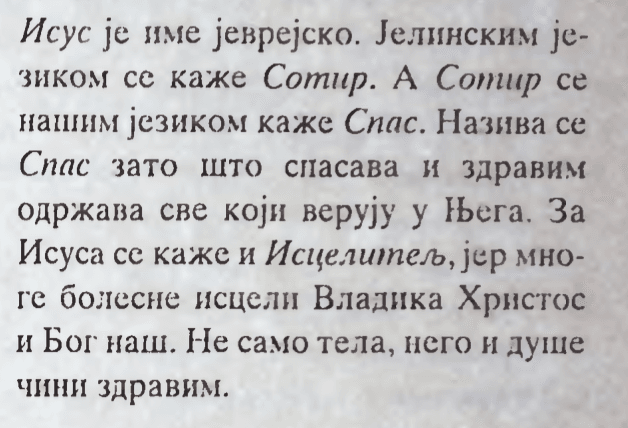
From the Zakonopravilo
In the Zakonopravilo, it is written that Jesus is the Hebrew name, that the Greeks say Sotir, and we say Spas (Savior). Hence, the old names of churches across Serbia dedicated to Christ are called “Church of Christ the Savior.”
The Jesus Prayer is a clear definition of who our God is. When confused, pressured by ecumenists, Hollywood, or various books, the Jesus Prayer is there to center you.
At the beginning, I wrote that the Jesus Prayer is the shortest form of Orthodox prayer, but is that the case? Isn’t “Lord, have mercy” shorter? It is not. Here’s why. The phrase “Lord, have mercy” can be said as part of a larger prayer, but on its own, it cannot stand because it is unclear which Lord is being referred to. Catholics, Muslims, and Jews all have their “lord,” so it is incorrect to say it without specification, as it does not distinguish us from others. Thus, “Lord Jesus Christ, Our God, have mercy on us” is, in fact, the shortest standalone prayer formulation.
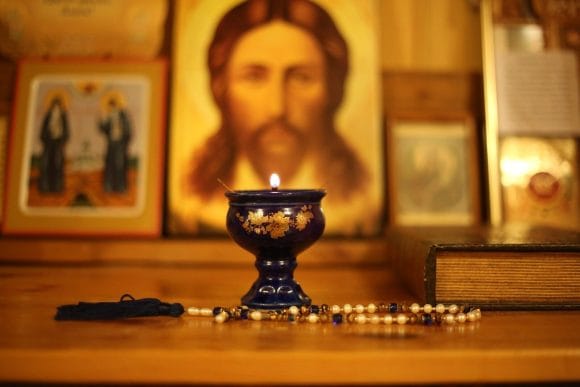

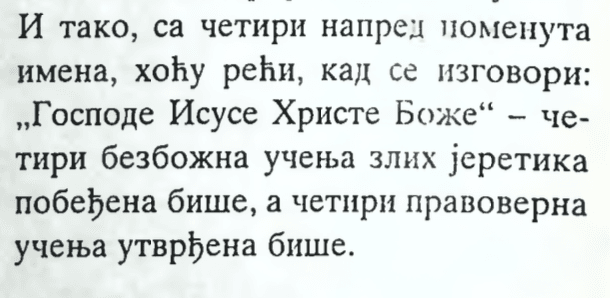
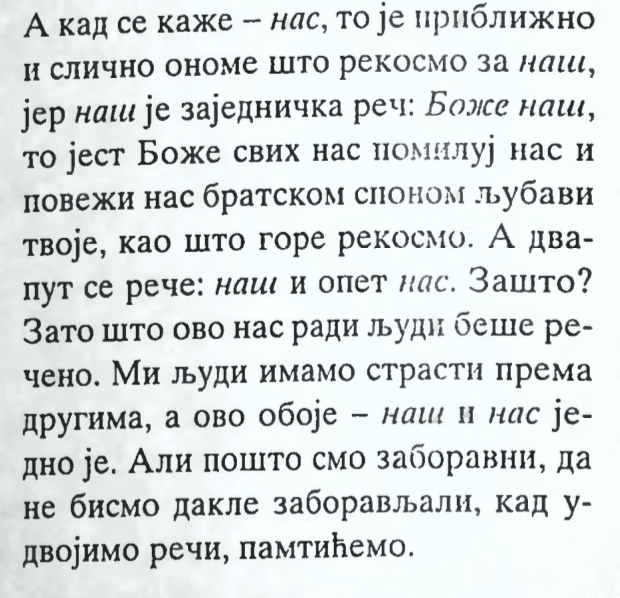
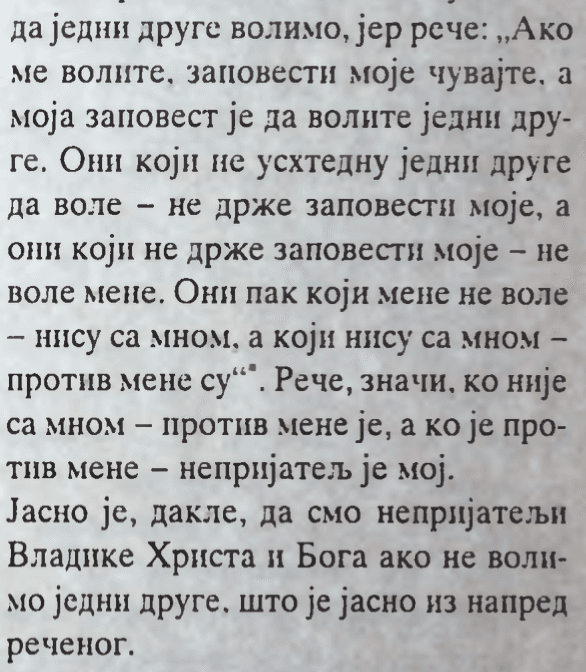

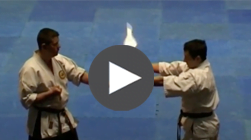
одличан тект…. може се и рећи ”Господе Спасе Христе Боже наш, помилуј нас. Амин.” У Законоправилу, на крају ове молитве има и Амин.
Тако је. Хвала.
Занимљив осврт на Исусову молитву. Наишла сам (код старца Тадеја мислим) и на овакву верзију: Исусе Христе, Сине Божји и Речи Божја, Богомајке ради, помилуј ме грешну (грешног). Била бих Вам захвална да прокоментаришете да ли је погрешно молити се овако.
Наравно да речи оца Тадеја не могу бити погрешне. Није погрешан такав начин ако човек разуме шта изговара. Ја пишем овде о тананим променама које су уведене временом и како то збуњује људе.
Ако сте ви свесни да је Син божији само један ипостас Бога, онда не грешите. Ако вас то збуњује онда шта да вам кажем… постоји и једноставнији старији облик који сам поменуо у тексту.
Свако добро.
Веома сам радостан због овог текста јер је аутор дао одговоре на два питања која ме одавно копкају. Прво је следеће: простим преузимањем назива Исус Христос, не само нас него целог света, Он је просто добио име и презиме код људи чиме се Бог сужава према ограниченом људском уму, чиме се губи и скрнави Божја неограниченост. Ми Срби смо то требали превести према нашем језику и нашим потребама молитве како би смисао Бога био потпунији. Његово једино одређење је да је у својој личности Син Божији што нам је управо Он саопштио а све друго је да је Он сам Бог “(Ко виде мене, виде Оца мога”) јер су они једно. Овде ћу стати јер је материја преобимна.
Дриго питање које обрађује аутор је појам “наш”. У постојећој молитви “Оче наш” на србском постоји разлика у односу на исту у црквено-словенском. Нпр. …као што и ми опраштамо дужницима својим у односу на црквено-словенски где стоји нашим. Дуго сам размишљао да ли то мења смисао и мој лични став је да мења јер се са заједничког прелази на лично пред Богом. Има ту још две разлике али оне нису битне за ову тему. Свако добро од Господа ( зна се на којег мислим🙂) и хвала на оваквим текстовима јер разбујају учмалост која је наступила.
Помаже Бог,
Као мали на слави код деде и ујака у метохијском селу Бича (етнички чисто српско, сада већ опустошено) када се сече/ломи славски колач домаћин каже “хајде да господимо” (да се помолимо Богу) и почне он да пева молитву (господи) са:
“Господи помилуј, Господи помилуј”
Затим сви присутни у хору:
“Хеј, Господе помилуј нас”
И ово се понови три пута.
Ако ме сећање добро служи ово би се певало и уочи славе.
Све ово у лепој интонацији и звучи тако мелодично да и дан данас то имам у глави.
Интересантно је да се Богу обраћа са Господи а касније са Господе.
Ето још једног доказа како су се наши стари молили.
Бог нам помогао и нико нам ништа не могао. :)
Хвала Дражене.